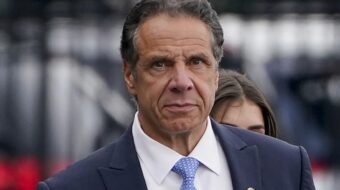Liberal and progressive strategists are dismissing media reports about the death of the public health care option as overblown speculation during a “slow news” period.
The characterization of the reports is being made by many, among them Mike Lux, CEO of Progressive Strategies, who said, “I don’t think anything has changed.”
Reacting to the media reports, Richard Kirsch, national campaign manager of Health Care for America Now, a coalition of liberal and labor groups, said, “There was no real news. No real change in the administration’s position.”
A contributing editor on Daily Kos, a leading liberal blog, wrote: “On Sunday, media outlets tripped over themselves to declare the death of the public option after [Secretary of Health and Human Services] Kathleen Sebelius told CNN’s John King that a public option is ‘not the essential element’ of healthcare reform.
“In chasing the Sebelius comments, those very same media ignored [White House press secretary] Robert Gibbs’ appearance on CBS ‘Face the Nation’ in which he both defended the public option and reiterated the president’s support for it.”
Sources in the labor movement note that the media could instead have reported, during a slow news weekend, that unions had successfully changed the tone of the health care reform town hall meetings. What began as forums for anti-Obama propaganda, they say, are now becoming platforms for real debate over what kind of reform is needed.
The AFL-CIO says that much of the credit for this goes to union members who have mobilized to take back the town halls from the campaign of misinformation being waged by extremist groups, backed by corporate donors and fueled with talking points from extremist Republicans.
A notable exception to the media ignoring labor’s role, ironically, was the conservative Washington Times which said, in an editorial yesterday, “Members of the nation’s labor unions have made up a hefty segment of the audiences that flocked to town halls Mr. Obama held in the past week, and they have played an even larger role in a nationwide campaign for an insurance overhaul. Financially, and with boots on the ground, unions have become the backbone of the president’s plan.”
The Times quotes Troy Goodson, a member of Electrical Workers (IBEW) Local 969 in Grand Junction, Colo., who explained why health care reform is needed. Goodson, 55, said he has triplets at home, and their hospital delivery costs alone would have left him underwater financially had he lacked adequate insurance. He said he’s glad to see union members out in force, pushing for the president’s plan: “The big corporations and the insurance industry, they’re lobbying 24/7. Someone has to fight against that.”
At the president’s town hall meeting in Helena, Mont., the crowd inside reached about 1,300, many of them union members. Outside, another 1,100 people rallied for and against reform. The Montana AFL-CIO reports that 700 of the 1,100 were union members and pro-health care reform supporters, outnumbering opponents by about two to one.
Labor and progressive groups are far more concerned about stopping Republicans who want to sabotage health care reform than they are with media reports about alleged “dropping” of the public option. They are now actively pressing Senate Democrats to forget about Republican Sen. Chuck Grassley (Iowa), for example, and move forward with their own plans for healthcare reform.
The main reason healthcare reform stalled in the Senate last month was because Senate Finance Committee Chairman Max Baucus (D-Mont.) spent many weeks sealed up in his office trying to get Grassley to buy some type of deal.
Although Baucus kept saying the conclave was making progress, the Senate left town for its recess, breaking the president’s deadline with no deal.
Baucus and other Democratic members of the Finance Committee plan to continue the talkfest with Grassley when they reconvene but leaders both in the liberal wing of their party and in the broader movement for healthcare are calling resumption of such talks a recipe for disaster.
“We need to push the Senate to move and pass a bill at a time when Sen. Grassley will probable not support any bill the Finance Committee has formulated,” said Roger Hickey, co-director of the Campaign for America’s Future. “We are encouraging Finance Committee members and Senate Democrats to do their own bill and not compromise with a bunch of Republicans who are not going to vote with them anyway.”
Grassley, the senior Republican on the Senate committee, angered liberals and progressives yesterday when he said he would not support healthcare legislation that does not have widespread Republican support.
“Sen. Grassley made it pretty clear that the Senate Finance Committee negotiations are a dead end if the goal is getting reform passed that will meet the president’s goals,” said Kirsch. “We’re making it really clear to Democrats that this is a dead end and they need to move forward on legislation themselves with the goals the president supports.”









